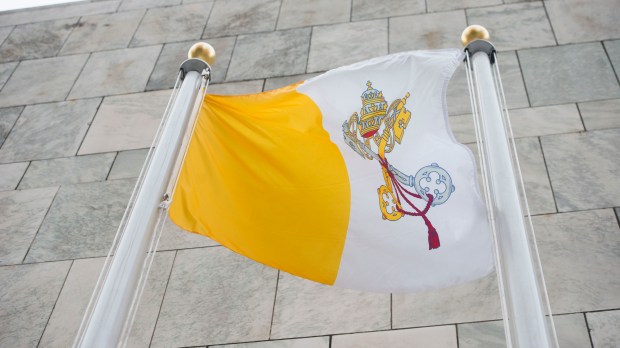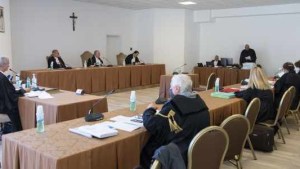The 18th hearing of the London building trial, held at the Vatican on May 30, 2022, was the first time that Roman banker Enrico Crasso, one of the 10 defendants, was heard. For nearly seven hours, the accused claimed his innocence and clarified his role as an advisor and investor to the Secretariat of State. In seven points, I.MEDIA reviews the main news of this day in the Vatican City court
Who is Enrico Crasso?
Enrico Crasso is a Roman banker who was entrusted with several investments and consulting projects by the Secretariat of State for 26 years. In a memorandum transmitted during the hearing, he explains that he was introduced to the predecessor of Archbishop Alberto Perlasca as head of finance of the central administration of the Holy See, Archbishop Gianfranco Piovano (in office until 2009), by the head of the Roman office of the American bank Merill Lynch.
At the time, he was working as director of a consulting firm, PrimeConsult, a company owned by the company Fiat and the bank Montepaschi di Siena, in which the Secretariat of State invested a little over 150,000 euros. In 2000, Crasso joined Credit Suisse, a Swiss bank in which the Secretariat of State invested nearly 40 million euros between 2000 and 2012.
In June 2014, he left Credit Suisse and founded Sogenel Capital Holding SA, an investment and consulting firm based in Lugano, Switzerland, through which he continues to work for the Holy See. In July 2016, his company was sold to AZ Swiss, and he became co-director of its patrimonial department, continuing to manage the patrimony entrusted by the Vatican. During the hearing, he said that in all the projects he has been able to conduct for the Secretariat of State in his career, “there has never been a negative return.”
During all these years, Crasso explained that he also worked regularly as a financial consultant for the Holy See. During his interrogation, however, he insisted that he had never received a formal mandate as a consultant from the Secretariat of State.
I never had instructions to withdraw a cent from the accounts of the Secretariat of State.
What is he accused of?
Crasso is now accused of embezzlement, corruption, extortion, money laundering, fraud, abuse of power, and forgery in public and private records.
He is accused of having received money in several operations and of having received secret commissions from Raffaele Mincione — charges that he completely denies. “I never had instructions to withdraw a cent from the accounts of the Secretariat of State,” he said during the interrogation, insisting that he had only the power of financial management.
Interestingly, his defense relies in part on a 2016 letter from Cardinal Pietro Parolin, the Holy See’s secretary of state, in which Pope Francis’ ‘right-hand man’ asserted that Vatican assets managed by Credit Suisse could be invested without adhering to Holy See norms and regulations.
Crasso’s conenction to Raffaele Mincione
At a meeting attended by Archbishop Angelo Becciu, Archbishop Alberto Perlasca, head of the Administrative Office, and Fabrizio Tirabassi, Enrico Crasso was asked to find a person capable of evaluating an investment project in Falcon Oil, an oil company run by the Angolan businessman Antonio Mosquito. It was under this contract, he explained, that he introduced banker Raffaele Mincione to the Secretariat of State in 2012, at the request of the Administrative Office of the Secretariat of State.
Specifically, he says he “proudly” took the letter from the Holy See to his superiors at Credit Suisse entrusting him with the mandate – for an investment of 200 million euros. His bosses directed him to the company’s London office, where he was introduced to Raffaele Mincione as an expert in raw materials.
Enrico Crasso explains that he felt that Raffaele Mincione and his team were competent, and that his role was then limited to evaluating the guarantees provided by the Angolan company. He claims to have advised the Holy See against accepting the offer – a version of events corroborated by Cardinal Becciu.
During this period, Raffaele Mincione formed the Luxembourg fund Athena to prepare the eventual investment, abounded by the Holy See to the tune of 200 million euros, which would then serve as a basis for the London investment of 60 Sloane Avenue after the Angolan project was abandoned in 2014. The Roman banker claims to be entirely “foreign” to this financial operation.
The warnings of Enrico Crasso
In his defense brief, Crasso states that he was only involved in the case between 2015 and 2016 when the Secretariat of State asked him to carry out a kind of audit on the Athena fund, administered by Raffaele Mincione. Citing email exchanges, he says he clearly questioned the investments made “in instruments without foundation and of doubtful feasibility.”
The Roman explains that he asked Mincione for clarification, without result. On the contrary, Crasso implies that the Italian-British banker would have asked “implicitly” Archbishop Perlasca and Fabrizio Tirabassi to remove him from the case.
In 2016, the Holy See reportedly asked Enrico Crasso for an opinion on an investment by a branch of the Athena fund, WRM CapInvest Ltd, in shares of the Popular Bank of Milan. Enrico Crasso declared that he had expressed “on several occasions his very strong reservations about this investment.”
In November of the same year, the Holy See entrusted Enrico Crasso with the task of having the banks (BSI and Credit Suisse) block an operation launched by Raffaele Mincione to ask the Credit Suisse and Clearstream groups to convert Athena’s assets from dollars to euros. Enrico Crasso claims to have prevented the redenomination.
Going to London was the biggest mistake of my life. I should have stayed out of it.
The “serious mistake” of the trip to London
Enrico Crasso claims to have “entered the London affair by accident,” having, according to him, no competence “to say whether or not the investment in London was a risky investment.”
“Going to London was the biggest mistake of my life. I should have stayed out of it,” he exclaimed in reference to the three days he spent in the British capital from November 20 to 23, 2018, with Fabrizio Tirabassi to sign the agreements to pass control of the London building from Raffaele Mincione to the Secretariat of State.
At the end of this trip, the control of the property was entrusted to the broker Gianluigi Torzi in conditions very unfavorable to the Holy See. These conditions, according to the Promoter of Justice, allowed him to extort 15 million from the Vatican.
Enrico Crasso maintains that he had no contact with Gianluigi Torzi prior to this meeting, but also that he did not have the legal competence to identify the irregularities in the very unfavorable agreement signed by the Holy See. His mission, he asserts, was limited to the management of a fund managing the rents of the tenants of the London building, not the control of the building itself.
The Centurion Fund
During his questioning the Justice Promoter and defense counsel also asked about Centurion, a Maltese investment fund that Enrico Crasso owned and managed other assets of the Secretary of State. The Promoter of Justice noted that Bishop Edgar Peña Parra had asked him to cease all investments on November 11, 2019, yet he continued thereafter.
Attention was directed to the acquisition of a building on Via Gregorio VII, a stone’s throw from the Vatican, for a value of over one million euros. Crasso explained that the investment had been decided before the letter from Bishop Peña Parra was sent, but also stated that he did not need the authorization of the Secretariat of State to make investments with this fund, as the Holy See was only a subscriber.
Next Hearings
The next hearing involved the continuation of the interrogation of Fabrizio Tirabassi. The hearing of June 1 was cancelled due to the impossibility of Nicola Squillace coming to court, explained the judge, Giuseppe Pignatone.
The next hearings will take place on June 6 and 7, when Raffaele Mincione will be heard for the first time. Then, on June 22, the questioning of Enrico Crasso will resume.



